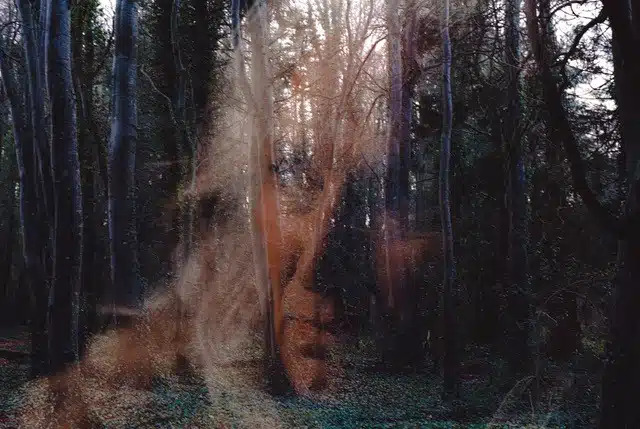A young couple Anna (Simone Collins) and Aleks (Charlie Maher) travel around bars, houses and towns, looking for old folk songs, the rarer the better, to sell to collectors. They take their bounty to a sort of rare folk song Antiques Roadshow where the ice-cool Agnes (Catherine Siggins, reminding me a little of Isabella Rossellini in Blue Velvet) appraises them. A rumour of a singer and a song long thought lost put these characters on the road to damnation. The fun, as always with horror, is the journey.
A visit to a woman called Rita Concannon (the surname surely a nod to Mad Max: Fury Road), played by the wonderful Olwen Fouéré in a ferocious cameo, unleashes hell. She tells Alex to leave and sings a song handed down from mother to daughter through generations, never written down and never recorded. This being a horror film and a modern one at that, a surreptitious recording is made and, to say the least, things go very, very awry.
Director Paul Duane is well known for his documentaries and, if you follow him on social media, his love of horror. The documentary work serves him extremely well here. He has made documentary films about rare music (While You Live, Shine), musicians (Very Extremely Dangerous) and horrors very real but almost unimaginable (Natan). That it has taken him until now to officially step into the horror genre is a touch surprising, though reading interviews with him, a necessity (and an opportunity) in many ways. His love of a particular type of horror shines through here. Eschewed are jump scares, hand-holding music and endless exposition; brought to the fore is dread, shifting identities and body horror.
What might not be talked about much in terms of reviews is not only the sense of musicality (the title itself is a droll play on words) but of a specific Irish musicality. Halfway through watching I was surprisingly reminded of Songs of Granite by Pat Collins (perhaps the best Irish film this century for this writer). In the film, Collins looks at the art of the song, of language, of how they are handed down and interpreted, and how they are kept alive. They are of the land. There are even ghostly visions towards the end of that film. We see ourselves at the beginning and at the end of life and realise how quickly one passes from one to the other. Collins looks back at a past of musical respect. Duane is almost inverting that here, arguing that the parasitic nature of the modern world, picking the historic bones clean and voraciously looking for more, is killing us slowly (and paying 0.2c per song for the privilege). He is not wrong.
All You Need is Death is an essential addition to the folk horror canon. It is well worth seeking out at the cinema if you can. The cast is unusually good for a film at this price point, and the main song itself by Lankum’s Ian Lynch and Duane, is really incredible. To say anything more in terms of plot would be to take away from what has been created here. And to be honest, Duane uses plot lightly, background to the atmosphere, the imagery, the edit, and the vibe. Indeed what are horror films if they are not to unbalance us, to render the world out of kilter and unimaginable to our everyday selves? Duane does this expertly, all lessons learned from countless horror watching and reading, knowing full well that while the story will likely be picked over initially, 10 years from now it is the dread and vision people will rightly remember. And as a low-budget calling card, one could not have done better. That old mainstay of low-budget horror film, the warehouse is utilised in terrific ways, with angles, rooms within rooms, glimpses of things we would rather not see, yet we can’t help but be compelled to look for. We are after all horror fans. We simply must look.

